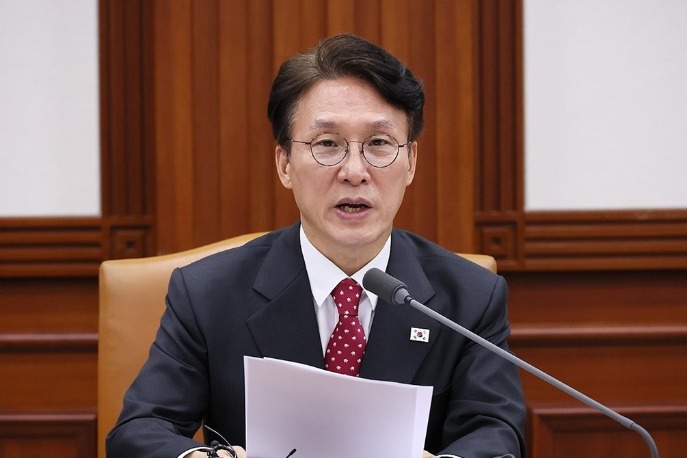South Korea has warned that unresolved visa disputes and currency swap issues with Washington could derail tens of billions of dollars in Korean corporate investments in the US, adding to strains in the two countries’ economic partnership.
Prime Minister Kim Min-seok urged Washington to act quickly to reassure Koreans concerned about getting detained for working in the US.
“Without resolving the visa issue, meaningful progress remains virtually impossible,” he told Bloomberg News in an interview in Seoul on Wednesday. He also touched on Seoul’s defense spending and North Korea.
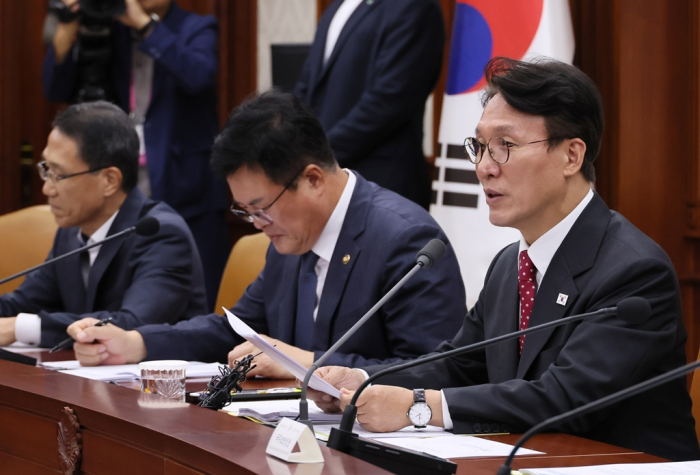
South Korean Prime Minister Kim Min-seok (right) presides over a Cabinet meeting in Seoul on Sept. 24, 2025
“Although the projects (in the US) have not been entirely halted or formally placed on hold, it will be very difficult for a large number of workers to enter or reenter the US until this problem is resolved,” Kim said, referring to the visa issue, which also casts clouds over a $350 billion investment fund agreed upon in a July trade deal.
The remarks come after hundreds of Koreans were taken into custody in a raid on a Hyundai Motor Co. and LG Energy Solution Ltd. battery plant under construction in Georgia earlier this month.
The detainees were released and returned home about a week after the raid, but the incident has rattled Korea, where images of shackled workers have circulated widely and fueled public anger, calling into question investment plans by Korean conglomerates.
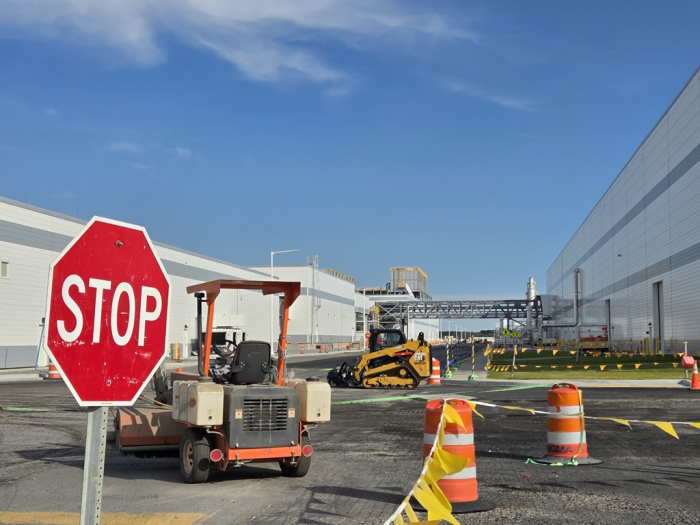
Construction equipment parked in front of the Hyundai Motor-LG Energy Solution joint battery plant in Ellabell, Georgia, following the US raid on the facility on Sept. 4, 2025 (KED file photo)
“In the absence of firm assurances regarding their safety, both they and their families are understandably reluctant to enter the US again while this matter remains unresolved,” the prime minister said during the Bloomberg interview, published on Thursday.
‘KOREA’S HEAVY US INVESTMENT MAY REQUIRE PARLIAMENTARY APPROVAL’
Kim said the visa impasse cast uncertainty over the July bilateral trade agreement, under which Seoul pledged $350 billion in additional funds for US investment.
Negotiations on how to structure and implement the package remain fraught, with Washington pressing for cash commitments on a scale comparable to Japan’s $550 billion pledge.
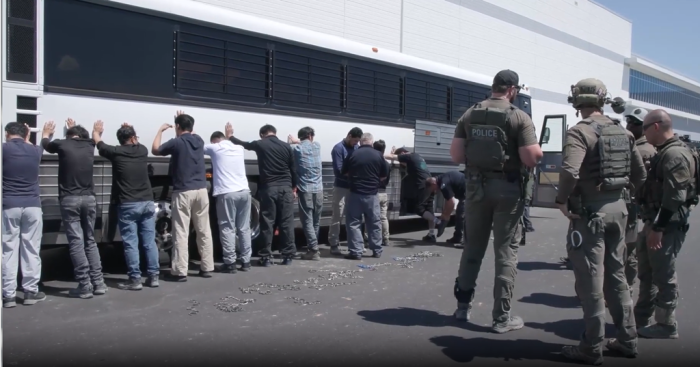
Workers at the Georgia construction site of a joint Hyundai Motor-LG Energy battery plant detained by US’ ICE on Sept. 6, 2025 (Screenshot captured from ICE’s video)
The investment pledge with Washington amounts to more than 70% of Korea’s foreign reserves, and the shock to the Korean economy would be severe without a currency swap agreement with the US, Kim said.
Korean President Lee Jae Myung, currently in New York to attend the UN General Assembly meeting, recently said in a Reuters interview that a currency swap agreement is needed to avoid a negative impact on Korea’s foreign exchange market – a crisis similar to what Korea experienced in 1997 during the Asian Financial Crisis – if the nation tries to meet all the US demands.
Prime Minister Kim declined to go into details of ongoing negotiations but said a deal that puts a significant fiscal burden on Korea may require parliamentary approval. He said he hoped talks over the deal wouldn’t extend into next year.
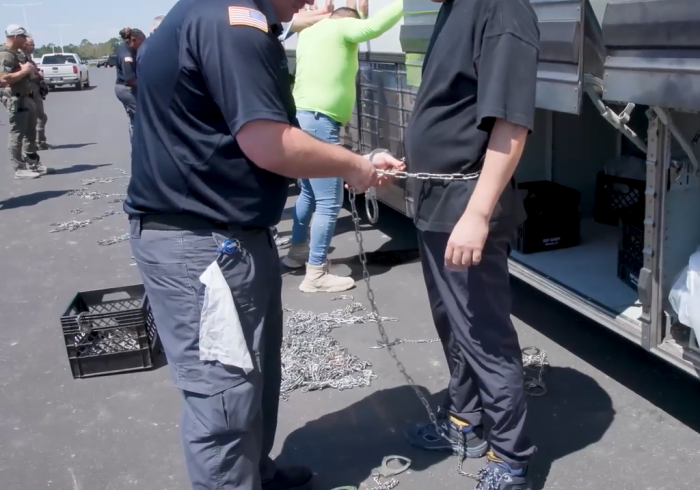
Workers at the Georgia construction site of a joint Hyundai Motor-LG Energy battery plant detained by ICE on Sept. 6, 2025 (Screenshot captured from ICE’s video)
“There’s the feeling that it’s difficult for us to accept that, not just the negotiating team but also among the public,” Kim told Bloomberg.
SEOUL’S DEFENSE SPENDING PLAN
On security issues, South Korea is looking to raise its defense spending to a 3.5% level of its GDP over the next 10 years, although nothing concrete has been decided, as part of a broader push to strengthen its independent national defense, Kim said.
“Recently, we mentioned 3.5%, and we did so because we judged that this is a level we are capable of sustaining,” he said. South Korea plans to spend 2.32% of its GDP on defense this year, according to Bloomberg.
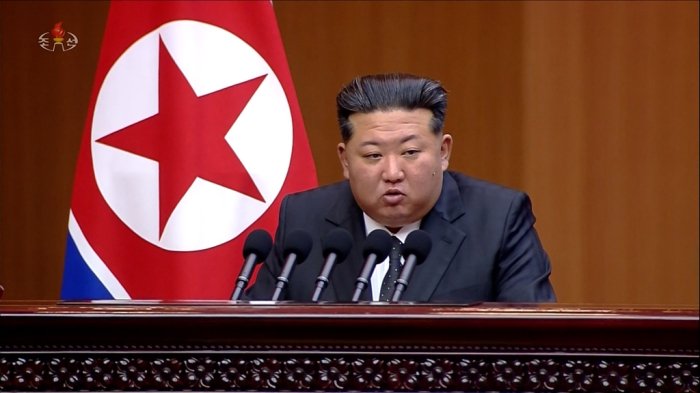
North Korean leader Kim Jong Un speaks to parliament in Pyongyang on Sep. 21, 2025′ (Courtesy of Yonhap)
A failure to reach an early deal may inject awkwardness into another expected meeting between Lee Jae Myung and Donald Trump next month when the US leader visits Seoul to join a gathering of APEC leaders in Gyeongju.
Asked about the possibility of North Korean leader Kim Jong Un coming to Gyeongju for the APEC summit and meeting with Trump on the sidelines, Kim said: “Since unexpected events can always occur, I believe we can leave open the possibility.”
The North Korean leader recently floated a potential meeting with Trump, saying he has “good memories” of the US leader and could talk with him again if Washington drops its denuclearization demands.
Write to In-Soo Nam at isnam@hankyung.com
Jennifer Nicholson-Breen edited this article.
